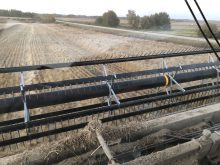From my viewpoint, this last stretch before spring can be the dreariest time of year.
A constant freeze-thaw cycle has rendered our landscape an icy mess, slightly less attractive than the ice planet Hoth from the Star Wars film franchise. It’s also about as safe to walk on as a concrete floor covered in ball bearings.
The spiritual warmth of the holiday season has long since faded. The warmth of spring keeps getting pulled away like Charlie Brown’s football each time the mercury dips again.
Read Also

Farm equipment market unlikely to pick up
North America’s farm machinery sales have been slow and uncertain thanks to tariffs and trade disruption. There’s not a lot of hope for change in 2026.
Cold winds continue to make outside work and activities unpleasant. And a lot of the simple pleasures many of us enjoy, like ice fishing, are wrapping up quickly.
To add insult to injury, the Winnipeg Jets, after an excellent season to date, are suddenly playing like a team that’s going to struggle to pass through the first round of the playoffs.
(Admittedly, that last one might just be me. Apparently, some people aren’t all that into hockey.)
But regardless of your feelings about the frozen game, this is a tough time of year to keep a positive mindset. It’s been a long time since most of us have seen a blade of green grass.
The effects on our emotional and physical wellbeing are profound. Energy levels can drop, and we can find ourselves seeking solace in sleep. We can feel apathetic, unmotivated and bored. We lose interest in friends and activities we usually enjoy. We feel irritable, moody and our interpersonal relationships can suffer.
I won’t speak for anyone else, but I personally have been known to pack on a few pounds every winter through boredom eating.
This is a time of year when it’s important to be self-aware but also aware of what others are going through, and to empathize. Reach out if you or someone you know is struggling. The truth is, we’re all probably struggling just a bit. It’s what makes this such a challenging but ultimately rewarding place to live.
While urban and rural residents share a lot of these seasonal challenges, there’s a healthy dollop of added stress for Canada’s farmers this year.
Vast swaths of the Prairies continue to be gripped by a multi-year drought. While prices have improved a bit lately, talk of a ‘grain glut’ has producers keeping a close eye on the bottom line and watching expenses more closely. Interest rates, though still historically about average, have risen from historic lows and remained elevated longer than many would hope.
It’s little wonder that study after study shows that Canadian farmers face rates of stress, depression and anxiety that are significantly higher than the general population. One I saw late last year linked it to the combination of economic uncertainty and climate change.
There’s little doubt that climate can erode a farmer’s wellbeing, be it emotional or economic, but others argue that policy uncertainty around the climate file adds another layer of stress.
It’s important to acknowledge there’s little any of us, farmers or urban residents, can personally do about many of the stresses we face. None of us are in control of interest rates, grain prices, wage growth, grocery prices, weather or climate.
All we can really do is hang on, exercise some self-care, and look out for each other. Eventually the snow will melt, the temperatures will warm, the rain will fall and the economic ship will right itself.
Selfcare starts with the basics: get enough sleep, eat healthy foods and get some exercise, for starters.
It also includes seeking support. Fortunately, in recent years the stigma around seeking help has begun to slip away. You may still run into the old attitudes here and there. But for the most part, I truly believe most would congratulate someone seeking a bit of support, rather than think less of them.
That support can be formal or informal. You may choose to speak to a spouse, sibling or close friend to unburden yourself. Or you may reach out to your faith leader if you have one. Plus, there are excellent professional mental health resources available in Manitoba, for little to no cost, for the province’s farmers.
There’s the Manitoba Farm, Rural & Northern Support Services, and its farmer’s help line, which is staffed 24/7, at 1-866-367-3276.
The Manitoba Farmer Wellness Program provides a no-cost, short-term counselling program delivered by professionals with backgrounds in agriculture. You can find out more on its website at manitobafarmerwellness.ca.
Take care of yourself during the coming stressful growing season. Your community, friends and family want you to stay safe.
















